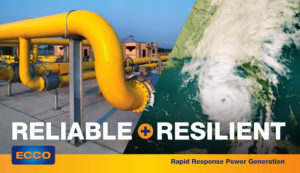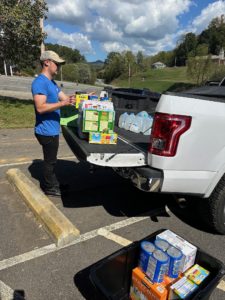In the wake of recent events like Hurricanes Milton and Helene, the devastating impact of natural disasters on local infrastructure has once again been highlighted. As communities face widespread damage and disruption, the energy sector is hit especially hard, with power outages and fuel supply interruptions posing significant challenges. Amid these crises, natural gas continues to stand out as a reliable and the essential backbone of our energy system, playing a key role in maintaining essential services and aiding recovery efforts.
Reliable and Resilient Energy Source
Natural gas infrastructure, especially its underground pipelines, is far less vulnerable to the damage caused by wind, flooding, and other impacts from natural disasters. Unlike above-ground power lines and oil supply chains that are frequently disrupted during storms, natural gas pipelines typically remain intact and operational. This reliability ensures a continuous energy supply, which is crucial for keeping essential services like hospitals, emergency response centers, and water treatment facilities running during and after disasters.
Rapid Response Power Generation
After a hurricane or natural disaster, restoring power is often the highest priority. Natural gas serves as an ideal fuel for backup power generation due to its clean-burning nature, efficiency, and availability, even when other energy sources are disrupted. Natural gas-fired power plants can be quickly activated to supply electricity to affected areas, ensuring that critical infrastructure stays operational and recovery efforts move forward without delay.
Additionally, natural gas generators are becoming an essential component of emergency preparedness plans for both residential and commercial use, providing reliable backup power for homes, hospitals, and emergency services when the grid goes down.
Supporting Emergency Services and Shelters
In times of disaster, shelters and emergency services rely on dependable energy to ensure safety and comfort for those displaced. Natural gas is frequently used to heat shelters, power cooking appliances, and supply hot water. Its consistent and reliable availability helps create a stable environment for people seeking refuge, even when electricity or other fuel sources are unavailable or in short supply.
Fuel for Transportation and Relief Efforts
 Natural gas vehicles (NGVs), such as buses and trucks, can play an important role in disaster relief and recovery efforts. Since natural gas refueling stations often remain functional after hurricanes or storms, NGVs can be used to transport emergency personnel, deliver supplies, and evacuate residents in a reliable and environmentally friendly manner. This reduces the strain on traditional gasoline and diesel supplies, which are often impacted by fuel shortages during disasters.
Natural gas vehicles (NGVs), such as buses and trucks, can play an important role in disaster relief and recovery efforts. Since natural gas refueling stations often remain functional after hurricanes or storms, NGVs can be used to transport emergency personnel, deliver supplies, and evacuate residents in a reliable and environmentally friendly manner. This reduces the strain on traditional gasoline and diesel supplies, which are often impacted by fuel shortages during disasters.
Maintaining Water and Wastewater Systems
Water and wastewater treatment plants are critical infrastructure components that must continue operating during natural disasters to prevent contamination and ensure access to clean water. Many of these plants use natural gas to power essential operations, such as pumping stations and treatment processes. The reliability of natural gas ensures that even in the face of widespread power outages, water systems can function effectively, safeguarding public health.
Building Resilience with Natural Gas
Natural gas plays a crucial role in supporting infrastructure resilience and recovery efforts during hurricanes and natural disasters. Its reliability, availability, and versatility make it an invaluable asset in disaster response, from keeping critical services running to supporting transportation and shelter needs. As communities around the world face increasing risks from natural disasters, natural gas will continue to be a vital resource for maintaining stability and rebuilding in the aftermath of storms.
By investing in natural gas infrastructure and expanding its integration into disaster preparedness plans, governments and businesses can enhance the resilience of their communities and ensure that they are better equipped to face the challenges of future natural disasters.
ECCO’s expert team is here to help with innovative products, solutions and infrastructure experts to help you ensure you are storm ready.
ECCO Assists in Rebuild Efforts
 In the wake of natural disasters, giving back to affected communities is more important than ever. It not only helps restore lives but also strengthens the bonds of compassion and support within communities. After the recent Hurricane Helene, ECCO team member Austin Essenburg, inspired by this spirit of giving, wanted to make a difference for his neighbors in the Asheville area and others impacted.
In the wake of natural disasters, giving back to affected communities is more important than ever. It not only helps restore lives but also strengthens the bonds of compassion and support within communities. After the recent Hurricane Helene, ECCO team member Austin Essenburg, inspired by this spirit of giving, wanted to make a difference for his neighbors in the Asheville area and others impacted.
With the generous support of our ECCO network, Austin and his wife Candace raised nearly $10,000 to purchase essential supplies for rural communities in Western North Carolina affected by the hurricane. The couple loaded an ECCO truck with water, diapers, baby formula, toilet paper, pet food, non-perishable food, batteries, and more, delivering these much-needed items directly to Marshall, NC. While there, they discovered an ongoing need for PPE. We are incredibly proud of Austin’s efforts, and the ECCO team remains committed to helping rebuild lives and restore communities in times of crisis.
